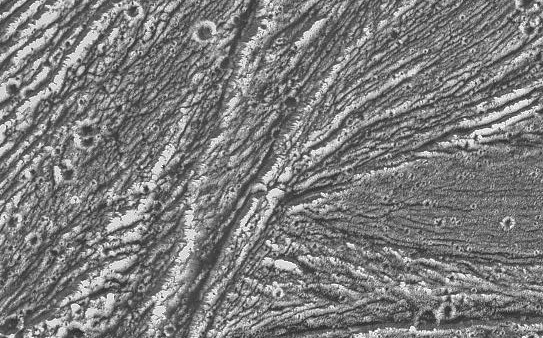Astronomy Picture of the Day
Discover the cosmos!
Each day a different image or photograph of our fascinating universe is
featured, along with a brief explanation written by a professional
astronomer.
July 10, 1996

Galileo Photographs Ganymede
Credit:
Galileo Mission
Team,
Galileo Spacecraft
NASA
Explanation:
Ganymede's surface is slowly being pulled apart.
This photo of Ganymede was
released earlier today by the Galileo team at NASA. The
Galileo Spacecraft arrived at
Jupiter
in December 1995. In late June, the spacecraft passed
within 10,000 kilometres of
Ganymede's icy surface, and took pictures
showing complex surface details for the first time. The
line-like features in this photo are sunlit ridges rising above
Ganymede's ice-plains.
The circular features are impact craters.
Ganymede
is the largest moon of
Jupiter and hence the largest of
the four Galilean satellites:
Io,
Europa,
Ganymede, and
Callisto.
APOD's Archive of Galileo at Ganymede
Tomorrow's picture: The Latest on Jupiter's Moon Ganymede
<
Archive
| Index
| Search
| Calendar
| Glossary
| Education
| About APOD
>
Authors & editors:
Robert Nemiroff
(MTU) &
Jerry
Bonnell (USRA)
NASA Technical Rep.:
Jay Norris.
Specific rights apply.
A service of:
LHEA
at
NASA/
GSFC
&:
Michigan Tech. U.
